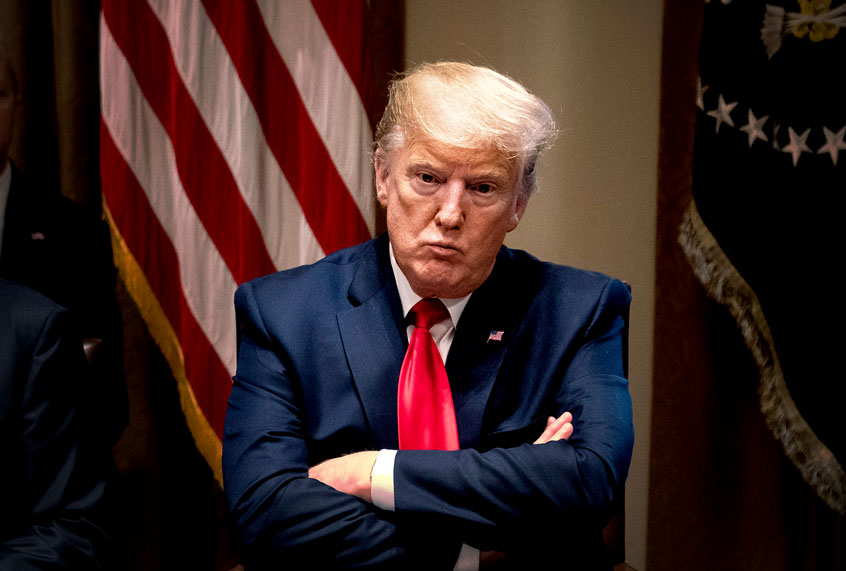President Donald Trump was impeached on charges of abuse of power and obstruction of Congress by a bitterly divided House of Representatives on Wednesday evening. By a vote divided almost precisely along party lines, the House recommended that the Senate remove the nation’s 45th president from office.
Trump became only the third president in history to face removal by the Senate for “high crimes and misdemeanors.” At 8:25 p.m., the House approved the first article of impeachment by a vote of 230 to 197, accusing Trump of abusing the power of his office by withholding nearly $400 million in military aid for Ukraine to pressure that nation to launch investigations of potential rival Joe Biden and the Democratic Party ahead of the 2020 election.
The historic vote occurred as Trump took the stage for a Christmas-themed campaign rally in Battle Creek, Michigan.
In the House chamber, not a single Republican crossed party lines to vote in favor of impeachment. Two Democrats — Reps. Jeff Van Drew of New Jersey and Collin Peterson of Minnesota — broke with their party to oppose the first article. (Van Drew is expected to become a Republican within the next few days.) Rep. Justin Amash of Michigan, an independent who left the Republican Party earlier this year, also voted to impeach the president. Rep. Tulsi Gabbard, D-Hawaii, a candidate for the Democratic presidential nomination who has been skeptical of impeachment, voted present.
A second article of impeachment, charging Trump with obstruction of Congress, also passed almost entirely along party lines, by a vote of 229 to 198. It accused the of blocking testimony and refusing to provide documents in response to House subpoenas in the impeachment inquiry. Again, no Republicans broke with their party to support it, although Amash, now an independent, again voted yes. Van Drew and Peterson were joined by a third Democrat, freshman Rep. Jared Golden of Maine, in voting no. (Golden was the only member to split his votes on the two articles.) Gabbard again voted present.
Earlier, on the House floor, Majority Leader Steny Hoyer, D-Md., praised Amash for having “no allegiance to either party, but to his country” and for having the “courage” to stand up to Trump. Hoyer, who has served in Congress for 38 years, said he never expected to witness “such obvious wrongdoing by a president of the United States” or such “craven rationalization of presidential actions.”
The articles of impeachment will presumably now move to the Senate, which is set to conduct only the third impeachment trial of a president in the nation’s 243-year history. Two other presidents have been impeached — Andrew Johnson in 1868 and Bill Clinton in 1998 — and both were ultimately acquitted and completed their terms in office. Richard Nixon resigned in 1974 before the House could vote on impeachment.
Earlier on Wednesday, Senate Majority Leader Mitch McConnell, R-Ky., said that Democrats were poised to “misuse the solemn process of impeachment to blow off partisan steam.” McConnell has made clear that he hopes the upper chamber will acquit the president as quickly as possible and has said he will not act as an “impartial juror” during the Senate trial.
The Senate trial is likely to begin after the New Year, with senators serving as jurors, House lawmakers serving as prosecutors known as “impeachment managers” and the Supreme Court Chief Justice John Roberts presiding.
The Constitution doesn’t detail how to hold a trial. A majority of senators need to set rules for the proceedings. McConnell and his Democratic counterpart, Minority Leader Chuck Schumer, D-N.Y., have indicated they want to follow the model of the five-week trial of Clinton in 1999, but they have very different views about how to do so. Schumer has said he wants to hear testimony from four administration witnesses who have not previously testified in the inquiry, including acting White House chief of staff Mick Mulvaney and former national security adviser John Bolton. McConnell has said the trial should not include witnesses.
“It is not the Senate’s job to leap into the breach and search desperately for ways to get to ‘guilty,'” McConnell said on the Senate floor Tuesday. “The Senate is meant to act as judge and jury — to hear a trial. Not to re-run the entire fact-finding investigation, because angry partisans rushed sloppily through it.”
Senate Republicans ultimately has the power to set the trial rules without Democratic votes, but that will require unity from at least 51 members of the 53-member GOP caucus. In 1999, the Senate approved a unanimous resolution establishing the rules of floor proceedings, followed by a vote along party lines to subpoena witnesses.
The Senate would require a two-third majority, or 67 votes, to convict the president and remove him from office. So at least 20 Republicans would need to break from Trump in order to convict him in a Senate trial, even assuming every Democrat votes to remove him from office. It is widely assumed, therefore, that whatever rules the Senate may adopt for a trial, it will end in Trump’s acquittal.

